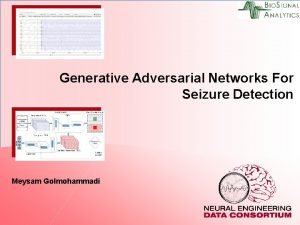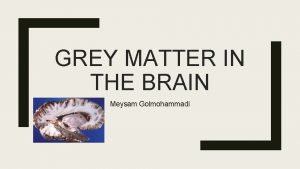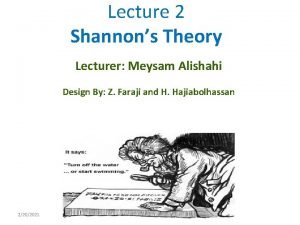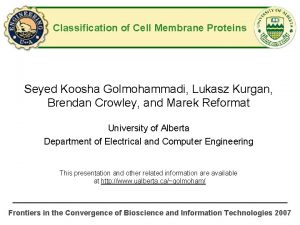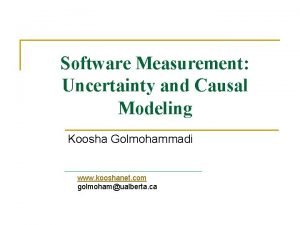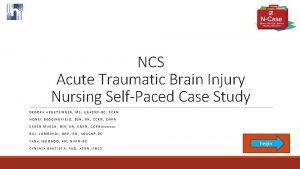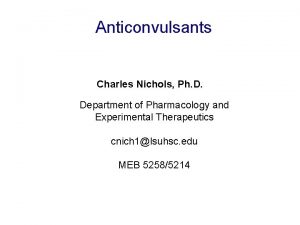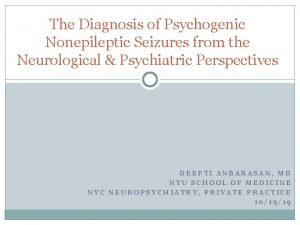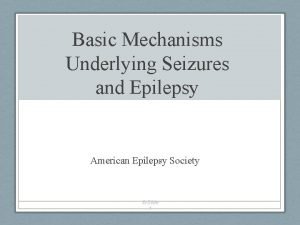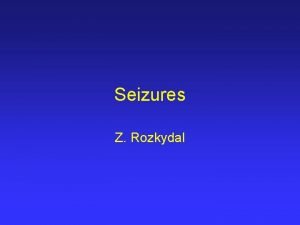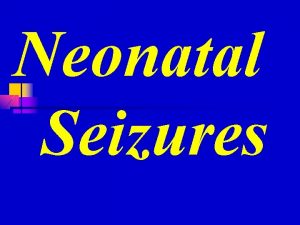CARDIAC EFFECTS OF SEIZURES Meysam Golmohammadi CARDIAC EFFECTS

![CARDIAC EFFECTS OF SEIZURES [Maromi Nei, 2009] • Seizures frequently affect the heart rate CARDIAC EFFECTS OF SEIZURES [Maromi Nei, 2009] • Seizures frequently affect the heart rate](https://slidetodoc.com/presentation_image_h2/9e97208ae1f8efdaf1b80791b31555b6/image-2.jpg)




![Seizure-Related Cardiac Abnormalities [Maromi Nei, 2009] • In adults and children, most complex partial Seizure-Related Cardiac Abnormalities [Maromi Nei, 2009] • In adults and children, most complex partial](https://slidetodoc.com/presentation_image_h2/9e97208ae1f8efdaf1b80791b31555b6/image-7.jpg)


- Slides: 9

CARDIAC EFFECTS OF SEIZURES Meysam Golmohammadi
![CARDIAC EFFECTS OF SEIZURES Maromi Nei 2009 Seizures frequently affect the heart rate CARDIAC EFFECTS OF SEIZURES [Maromi Nei, 2009] • Seizures frequently affect the heart rate](https://slidetodoc.com/presentation_image_h2/9e97208ae1f8efdaf1b80791b31555b6/image-2.jpg)
CARDIAC EFFECTS OF SEIZURES [Maromi Nei, 2009] • Seizures frequently affect the heart rate and rhythm. In most cases, seizure-related cardiac changes are transient and do not appear to cause clinically significant abnormalities for the patient. • Great interest in this area of research has been generated because of a possible connection with sudden unexpected death in epilepsy (SUDEP). • While there are clear, but rare complications from seizure-related cardiac arrhythmias, such as ictal asystole that causes syncope, the overall risk of seizures on cardiac status and any potential connection between seizures and SUDEP still remain uncertain.

SUDEP • SUDEP is the sudden, unexpected death of someone with epilepsy, who was otherwise healthy. • Each year, more than 1 out of 1, 000 people with epilepsy die from SUDEP. • However, it occurs more frequently in people with epilepsy whose seizures are poorly controlled. One out of 150 people with poorly controlled epilepsy may die from SUDEP each year. • SUDEP is the leading cause of death in young people with certain types of uncontrolled epilepsy.

What causes SUDEP? • No one knows what causes SUDEP! • SUDEP occurs most often at night or during sleep and the death is not witnessed, leaving many questions unanswered. • The person with epilepsy is often found dead in bed and doesn't appear to have had a convulsive seizure. • There may be evidence that a person had a seizure before dying, but this isn’t always the case. • About a third of them do show evidence of a seizure close to the time of death. They are often found lying face down.

Current researches on SUDEP • Current research into the possible causes of SUDEP focuses on problems with breathing, heart rhythm and brain function that occur with a seizure. • Breathing • A seizure typically may cause a person to briefly stop breathing (apnea). If these breathing pauses last too long, they can reduce the amount of oxygen that gets to the heart and the brain. • A lack of oxygen can be life threatening if not treated immediately. Also, a person’s airway may sometimes get blocked during a convulsive seizure, leading to suffocation (inability to breathe). • Heart Rhythm: a seizure may cause a dangerous heart rhythm or cardiac arrest. • Brain Function: Seizures may suppress or interfere with the function of vital areas in the brainstem. These areas are responsible for breathing and heart rate as well as other important body functions. As a result, changes in brain function could cause dangerous breathing and heart rate changes. • Others: SUDEP may result from more than one cause, or from a combination of breathing difficulty, abnormal heart rhythm and changes in brain function. Or, it may result from factors researchers have yet to discover.

What can we do? • The biggest problem is lack of data for SUDEP. • The first step is developing a recording system for smartwatches or smartphones that record EEG data continuesly. • These data can help neurologists to study SUDEP and find the main reason of SUDEP. • I believe by developing such a system, and gathering data, after a few years, we might predict SUDEP.
![SeizureRelated Cardiac Abnormalities Maromi Nei 2009 In adults and children most complex partial Seizure-Related Cardiac Abnormalities [Maromi Nei, 2009] • In adults and children, most complex partial](https://slidetodoc.com/presentation_image_h2/9e97208ae1f8efdaf1b80791b31555b6/image-7.jpg)
Seizure-Related Cardiac Abnormalities [Maromi Nei, 2009] • In adults and children, most complex partial and generalized tonic–clonic seizures cause an increase in heart rate. • One research reported that 92% of 26 patients with temporal lobe seizures recorded by ambulatory EEG–EKG monitoring were associated with a dominant increase in heart rate. • Seizures clearly cause both interictal and ictal cardiac abnormalities. • Cardiac autonomic status is altered in patients with epilepsy but the clinical significance of these findings, particularly their possible association with SUDEP, is unknown. Both cardiac and • respiratory functions are affected by seizures, and dysfunction of the respiratory system during seizures can affect cardiac function. • Additional studies, particularly those combining multiple recording modalities to assess respiration, EKG, oxygenation, and EEG simultaneously are needed to further elucidate the relationship of seizures to cardiac status in epilepsy.

Heart rate changes and ECG abnormalities during epileptic seizures [Zijlmans M 1, Flanagan D, Gotman J. , 2002] • They analyzed retrospectively 281 seizures in 81 patients with intractable epilepsy who had prolonged video-EEG and two-channel ECG. The nature and timing of heart rate changes compared to the electrographic and clinical seizure onset was determined. • They found there was an increase in heart rate of at least 10 beats/minute in 73% of seizures (93% of patients) and this occurred most often around seizure onset. In 23% of seizures (49% of patients) the rate increase preceded both the electrographic and the clinical onset. ECG abnormalities were found in 26% of seizures (44% of patients). One patient had an asystole for 30 seconds. Long seizure duration increased the occurrence of ECG abnormalities. No other risk factor was found. • Heart rate changes occur frequently and occur around the time or even before the earliest electrographic or clinical change. The change can clarify the timing of seizure onset and the specific rate pattern may be useful for seizure diagnosis and for automatic seizure detection. ECG abnormalities occur often and repeatedly in several seizures of the same patient.

Summary • Researchers are not certain on cardiac effects of seizures. • Great interest in this area of research has been generated because of a possible connection with SUDEP. • Analyzing of EKG channel should not be considered in developing of Auto. EEG in this phase of development. • SUDEP is a great concern for people with epilepsy and their family. • To combat with SUDEP we need to develop a simple continues monitoring system using smart devices, collect data of SUDEP and save the lives by prediction.
